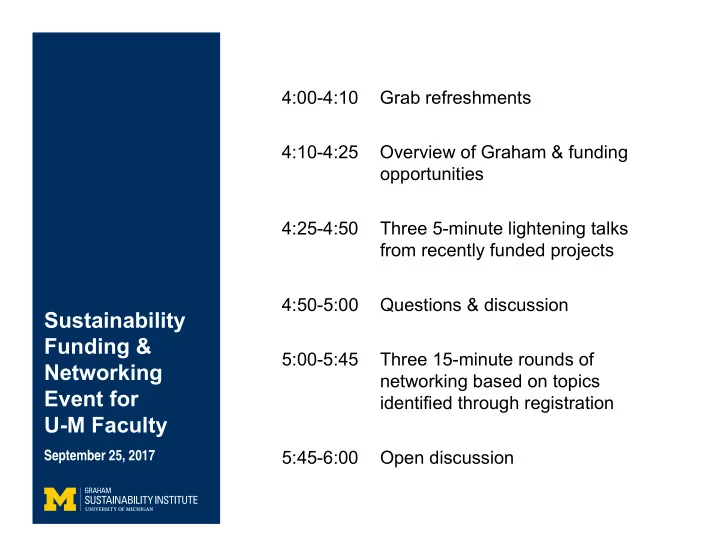

4:00-4:10 Grab refreshments 4:10-4:25 Overview of Graham & funding opportunities 4:25-4:50 Three 5-minute lightening talks from recently funded projects 4:50-5:00 Questions & discussion Sustainability Funding & 5:00-5:45 Three 15-minute rounds of Networking networking based on topics Event for identified through registration U-M Faculty 5:45-6:00 Open discussion September 25, 2017
Graham Sustainability Institute The Graham Institute catalyzes and facilitates sustainability-focused collaborations involving faculty, students, and external stakeholders. We work with organizations to understand specific needs and foster connections with relevant expertise throughout the university. We link science to real-world action by supporting the work of collaborative teams spanning multiple disciplines and sectors. We also believe diversity, equity, and inclusion are key to individual empowerment and the advancement of sustainability.
Emerging Opportunities Program Catalyst Other Support Fast Track Transformation Grants and Resources Grants Grants Faculty Networking, Faculty Networking, Conference Hosting, Conference Hosting, Collaborative Research Collaborative Research Stakeholder Engagement, Stakeholder Engagement, Work requiring Work requiring Project Planning, Project Planning, Activities Activities and Assessment and Assessment Project Management Project Management limited funding limited funding White Papers, White Papers, Initiatives Initiatives and Evaluation, and Evaluation, Workshops Workshops Special Initiatives Special Initiatives Up to $2,500 award Up to $2,500 award Up to $100,000 per year Up to $100,000 per year Up to $10,000 per award Up to $10,000 per award Requires 50% match Requires 50% match 3-6 month grant period 3-6 month grant period 8 month grant period 8 month grant period Graham Staff Graham Staff Support Support 1-2 year grant period 1-2 year grant period 4-6 grants per semester 4-6 grants per semester Up to 6 awards annually Up to 6 awards annually on a rolling basis on a rolling basis Up to 2 awards per year Up to 2 awards per year Schedule Schedule Fall and Winter RFPs Fall and Winter RFPs Fall and Winter RFPs Fall and Winter RFPs Fall RFP Fall RFP Ongoing Ongoing
Emerging Opportunities Characteristics We consider a number of factors in determining whether and how we support projects, including: Actionable Question Solutions Orientation The project is framed in a way that will yield actionable options for decision Is the project framed in a way that will yield actionable options for decision makers and practitioners. makers and practitioners? Faculty Expertise from Multiple Disciplines The project brings together a strong team representing multiple disciplines, with preference given to projects that draw on the breadth and depth of expertise of U-M faculty, and researchers from other institutions when appropriate. Engaged Partner The project engages a specific external partner (or partners) willing to invest their time, provide input, and work with researchers to identify actionable options.
Emerging Opportunities Characteristics We consider a number of factors in determining whether and how we support projects, including: Actionable Question Advances Scholarship The project supports scholarly work of faculty researchers and others. Is the project framed in a way that will yield actionable options for decision makers and practitioners? Student Opportunities The project offers opportunities for U-M students to engage across disciplines, appreciate diversity, think systemically, and pursue action- based learning worldwide.
Program Timeline RFP LOI Proposal Award Project Release Deadline Deadline Date Start Transformation Sept. 7, 2017 Jan. 29, 2018 March 12, 2018 Late Apr. 2018 May 2018 Fall Catalyst Sept. 7, 2017 Oct. 9, 2017 Nov. 13, 2017 Late Dec. 2017 Jan. 2018 Rolling until Sept. 7, 2017 N/A semester funds Rolling Rolling Fall Fast Track are committed Jan. 15, 2018 Feb. 12, 2018 March 19, 2018 Late Apr. 2018 May 2018 Winter Catalyst Rolling until Winter Fast Jan. 15, 2018 N/A semester funds Rolling Rolling Track are committed
Lightning Talks Leveraging Existing Data & Insights into the Policy Process to Accelerate Progress Tow ard Achieving Sustainable Diets in the Global South Andy Jones, School of Public Health Advancing Climate Adaptation Initiatives for Indigenous Tribes w ithin the Great Lakes Region Frank Marsik, College of Engineering, CLaSP Atmospheric Modeling in Human Health & Climate Change Risk Assessment: Wildland Fire Smoke Exposures Trish Koman, School of Public Health
Questions & Discussion Leveraging Existing Data & Insights into the Policy Process to Accelerate Progress Tow ard Achieving Sustainable Diets in the Global South Andy Jones, School of Public Health Advancing Climate Adaptation Initiatives for Indigenous Tribes w ithin the Great Lakes Region Frank Marsik, College of Engineering, CLaSP Atmospheric Modeling in Human Health & Climate Change Risk Assessment: Wildland Fire Smoke Exposures Trish Koman, School of Public Health Emerging Opportunities Program John Callewaert & Maggie Allan, Graham Institute
Units Represented A. Alfred Taubman College of Architecture and Urban Planning College of Engineering School for Environment & Sustainability Horace H. Rackham School of Graduate Studies College of Literature, Science, and the Arts Medical School School of Music, Theatre & Dance School of Public Health School of Information
Common Themes Built Environment Climate & Energy Collaboration, Engagement, Methods Food and Agriculture Manufacturing, Materials & Recycling Transportation Water
Networking Three 15-minute rounds of networking. Round 1 Choose a table Round 2 Stay at that table or move to a new one Round 3 Stay at that table or move to a new one
Complete application materials, including review criteria and reporting requirements at graham.umich.edu/emopps John Callewaert Maggie Allan Program Director Program Officer Emerging Opportunities Emerging Opportunities jcallew@umich.edu maallan@umich.edu 734-615-3752 734-763-0749
Recommend
More recommend